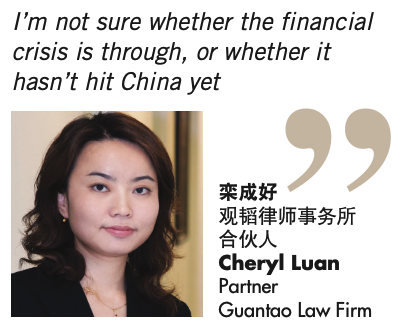As China emerges from the economic downturn, the rules of the game have changed. Law firms are adapting to the new environment, and in-house counsel are under pressure to do more work in-house By Robin Weir
“I’m not sure whether the financial crisis is through, or whether it hasn’t hit China yet,” says Cheryl Luan, a partner at Guantao Law Firm in Beijing. Luan’s uncertainty reflects a small but persistent worry at the back of many lawyers’ minds. To underpin economic growth in the face of the global financial crisis, the government pumped a startling amount of cash into China’s economy. (The figure announced in November 2008 was RMB4,000 billion, or US$586 billion.) According to the European Union Chamber of Commerce in China, the total amount lent by Chinese banks in the first seven months of 2009 will be almost as much as the totals for 2007 and 2008 combined. But the jury is still out on whether this stimulus money has had the desired effect, or whether it will merely delay an inevitable economic shock. “Is it really over,” asks Luan, “or has the centra government invested so much money that after the whole world is through with the crisis, we will suddenly start to feel it?”

Morrow is by no means a lone voice. The vice-president and general counsel of a high-technology manufacturing company in the US believes that “the high cost of outside law firms will encourage more ‘in-sourcing and the development of in-house counsel to handle work internally”.
You must be a
subscribersubscribersubscribersubscriber
to read this content, please
subscribesubscribesubscribesubscribe
today.
For group subscribers, please click here to access.
Interested in group subscription? Please contact us.
你需要登录去解锁本文内容。欢迎注册账号。如果想阅读月刊所有文章,欢迎成为我们的订阅会员成为我们的订阅会员。
Satisfied with law firms in China?
“Law firms need to assign a seasoned partner to ensure that they take individual responsibility to supervise the work of associates and junior partners by reviewing and approving all invoices prior to issuance. The worst impact on a relationship with an outside law firm is for the general counsel or chief legal officer to receive an unanticipated or excessive invoice.”
Gregory Morrow, vice-president and chief legal officer, Contessa Premium Foods
“As the legal regime in China gets more complex, the need for specialization is increasing, and many lawyers haven’t shifted to that model yet, with the result that we find lawyers who are solid in one area who purport to be knowledgeable in others, but who aren’t.”
Sherman Chu, general counsel, Cisco China
“Satisfied with the best (most expensive) firms. Neutral to dissatisfied with advice from lower-tier firms. In the latter case, their analysis is sometimes wrong or terribly unsophisticated.”
Scott Kissinger, legal director – Asia Pacific, Elsevier & LexisNexis
“Not satisfied with US law firms charging US rates for associates with only Chinese language skills and little China experience.”
Vice-president and general counsel, a US manufacturing group
“There are some good local firms, but not many. As a general matter, the quality needs to improve in terms of providing options and solutions.”
Tina Min, senior China attorney, Wrigleys Confectionery
“A lot more expensive than in continental Europe. A lot more time consumed for work that we would consider standard questions and queries. Sometimes there are very many people involved (European partner, Chinese partner, Chinese associate) which adds to complexity of the answer, and the bill.”
Susanne Stollhoff, legal counsel, StepStone Services





















